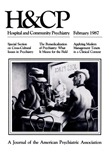Clinical Considerations in Cross-Cultural Diagnosis
Abstract
When psychiatrists and patients come from different cultural backgrounds, special knowledge, assistance, and awareness are needed for accurate diagnosis. Understanding the sociocultural milieu in which the patient lives and functions is crucial for distinguishing psychopathology from culture-bound beliefs or be- havior. Clinical observation and physical examination may be the primary diagnostic tools in the cross-cultural setting if clinical history is scanty or the mental status examination is unsatisfactory. Interviewing techniques must be designed to encourage rapport and reduce fear. The author discusses issues to be consid- ered in choosing the language to be spoken during the interview and using a translator. He emphasizes the need for clinicians to detect and transcend their own cultural biases and those of their patients, as well as the need for professional training in making cross-cultural diagnostic assessments.
Access content
To read the fulltext, please use one of the options below to sign in or purchase access.- Personal login
- Institutional Login
- Sign in via OpenAthens
- Register for access
-
Please login/register if you wish to pair your device and check access availability.
Not a subscriber?
PsychiatryOnline subscription options offer access to the DSM-5 library, books, journals, CME, and patient resources. This all-in-one virtual library provides psychiatrists and mental health professionals with key resources for diagnosis, treatment, research, and professional development.
Need more help? PsychiatryOnline Customer Service may be reached by emailing [email protected] or by calling 800-368-5777 (in the U.S.) or 703-907-7322 (outside the U.S.).



